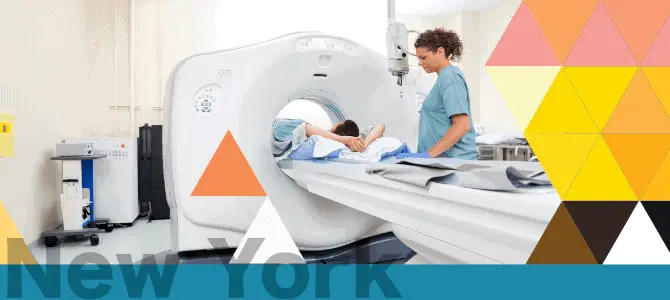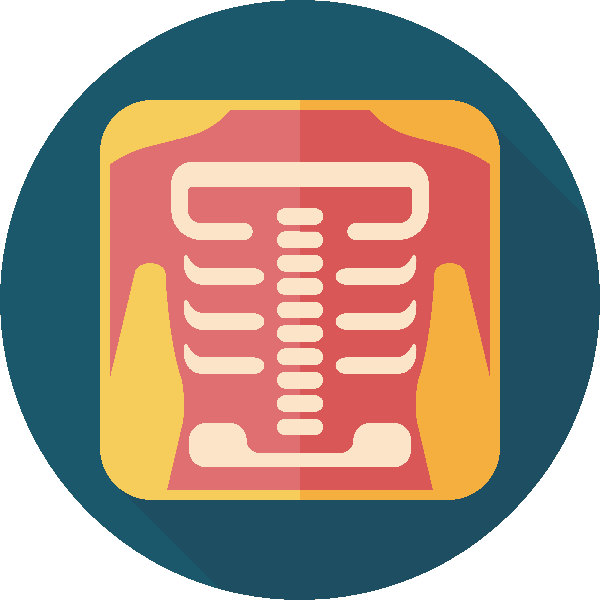Radiation Therapy Schools In New York

Whether a certificate, an associate degree, or a bachelor’s degree in Radiation Therapy is a student’s first choice, there is an accredited educational program in New York to suit. All three options are available within the state, although not every program is offered by every institution.
Students who already hold an associate degree in Radiologic Technologies can also opt to extend their skills and employment prospects by choosing to complete a program of Radiation Therapy education that can then lead to an award of a bachelor’s degree.
In This Article
How to obtain professional credentials as a Radiation Therapist in New York
Radiation Therapists seeking a license to practice in New York are required to provide proof that they have passed the examination set by the American Registry of Radiologic Technologists (ARRT) with a scaled score of at least 75. The examination is four hours long and checks for knowledge of material that is covered as part of a Radiation Therapy education program. This includes the correct treatment of patients, principles of planning radiation treatment, the fundamental concepts of radiation oncology, and an understanding of health and safety issues and precautions.
Passing the examination represents just one of the three important criteria that ARRT has defined for candidates who are seeking to become members and obtain professional credentials as a Radiation Therapist.
Candidates must also demonstrate that they can meet the ARRT ethical code which is detailed in the ARRT Standard of Ethics document. A history of misdemeanors or felonies is likely to disbar a candidate from membership and candidates are required to share details of any such convictions as part of the application process.
The third criteria to apply for membership of ARRT is evidence of completion of an appropriate, accredited, and approved program of studies in Radiation Therapy plus possession of an associate degree or better.
Once a candidate has been admitted to membership of ARRT, they are required to demonstrate that they are refreshing their knowledge and keeping their skills up to date by completing Continuing Education credits once every two years and Continuing Qualification credits once every ten years.
View also:
- Radiologic technologist schools in New York
- Learn about radiation therapy education & career requirements
How to become a licensed Radiation Therapist in New York
In the state of New York, Radiation Therapists are required to be licensed in order to practice. Licensure is handled in the state by the New York State Department of Health Bureau of Environmental Radiation Protection. Radiation Therapists are licensed under the umbrella category of radiologic technologists.
To obtain a license, applicants must have completed a program for Radiation Therapy education that has been approved by the New York State Health Department. Applicants are also required to be of good moral character and must demonstrate that they have passed the examination given by the American Registry of Radiologic Technologists (ARRT) by presenting their ARRT membership credentials.
Sponsored Programs
The College of Health Care Professions , Online
Location - Mcallen, TX, US 78504The College of Health Care Professions is a Texas-based career education school founded by physicians in the Texas Medical Center solely specializing in healthcare education and dedicated to provid... Read More
ProgramsLimited Medical Radiologic Technologist with MA Skills - Certificate
Accredited Radiation Therapy Schools in New York
Center for Allied Health Education
The Center for Allied Health Education offers a variety of medical education courses and certificate programs in Diagnostic Medical Sonography (Ultrasound), Radiography, Radiation Therapy, Surgical Technology, and Paramedic Training.
The Radiation Therapy educational program on offer here is a two-year program that leads to the award of a Certificate in Radiation Therapy. The program is approved by the American Registry of Radiologic Technology (ARRT) and the New York State Health Department and fully accredited by the Joint Review Committee on Education in Radiologic Technology (JRCERT).
In addition to classroom learning and clinical practicums, the curriculum includes practical training related to patient care, technical operation of a linear accelerator, dosimetry, and brachytherapy.
The Center for Allied Health Education has agreements in place with St. Francis College (Brooklyn, NY) and Clarion University of Pennsylvania’s online college programs which mean that graduates of the Radiation Therapy Program will receive credits towards a bachelor’s degree in radiologic or medical imaging sciences from these institutions.
1401 Kings Highway
Brooklyn, NY 11229
718-645-3500
Website: https://www.cahe.edu/
Memorial Sloan-Kettering Cancer Center
Founded in 1884, Memorial Sloan Kettering Cancer Center is the largest and oldest private cancer center in the world. It focuses on cancer treatment, education, and research. The MSKCC School of Radiation Therapy was established in 1970.
The two-year educational program at the school results in the award of a Memorial Hospital Certificate in Radiation Therapy upon completion. The American Registry of Radiologic Technology (ARRT) and the New York State Health Department have reviewed and approved the curriculum, while accreditation has been granted by the Joint Review Committee on Education in Radiologic Technology (JRCERT).
During the course of their studies, students are exposed to the latest advances in 3D-IMRT, organ motion studies, and research protocols. The Radiation Therapy School is well-equipped and includes ten Varian linear accelerators; IGRT technology; and a Brachytherapy suite.
School of Radiation Therapy, Box 22
Memorial Sloan Kettering Cancer Center
1275 York Avenue
New York, NY 10065
212-639-6835
Website: https://www.mskcc.org/
Nassau Community College
Located on Long Island is the largest single-campus community college in the state of New York, Nassau Community College. This two-year college, which is part of the State University of New York (SUNY) education system, offers an Associate of Applied Science in Radiation Therapy.
The 70-credit program requires four semesters and three summer sessions to complete. The study program combines technical and liberal arts courses delivered at Nassau College with off-campus clinical education at a variety of affiliated hospitals and standalone cancer centers. Students rotate through four different clinical settings during their studies. These take place at healthcare providers located in Manhattan, Queens, Nassau, and Suffolk Counties.
The program has been approved by the American Registry of Radiologic Technology (ARRT) and graduates are eligible to apply to the organization for membership and professional credentials. Formal accreditation is in place from the Joint Review Committee on Education in Radiologic Technology (JRCERT). The program has also been approved by the New York State Health Department.
One Education Drive
Garden City, New York 11530
516.572.7501
Website: http://www.ncc.edu/
SUNY Upstate Medical University
The State University of New York (SUNY) Upstate Medical University is an upper-division/transfer health sciences research and teaching university located in Syracuse.
Of interest to prospective Radiation Therapists here is a Bachelor of Science program that is available for enrollment to students transferring with 60 arts and sciences credits. Also available is a Bachelor of Professional Science program that is suitable for students who already hold an associate degree and are registered, or registry-eligible, medical radiographers.
The program, which has been fully accredited by the Joint Review Committee on Education in Radiologic Technology (JRCERT), requires five semesters to complete. The curriculum consists of a mix of classroom-based training delivered in Syracuse and a selection of clinical rotations which take place across central New York. Locations include the Buffalo area, the Capital/Hudson Valley, the Rochester area and so forth. Students may request that all their clinical rotations take place in a particular area in order to simplify their accommodation and travel considerations, or they may request to undertake rotations in a variety of geographical areas to achieve a greater variety in their clinical experiences.
Completion of this bachelor’s program will satisfy the educational requirements of the New York State Health Department and the American Registry of Radiologic Technology (ARRT). Graduates are therefore well prepared to apply to ARRT for membership and to obtain professional credentials before applying to the New York Department of Health for a license to practice.
Weiskotten Hall
766 Irving Avenue, Room 1213
315 464-4570
Website: http://www.upstate.edu/

